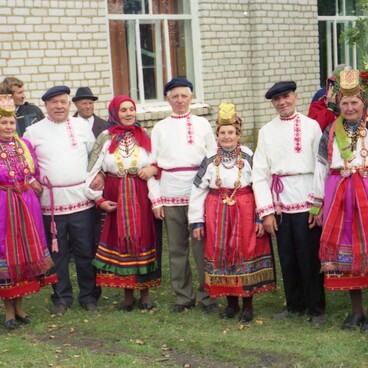Sergey Osipovich Krasilshchikov is a prominent representative of the Upper Volga pastoral tradition. It was widespread in Zubtsovsky, Rzhevsky and Staritsky districts of Tver Oblast. In addition to the region-specific repertoire, a significant place in it is occupied by “foreign” song material. It was brought by shepherds who went to distant villages to earn money. These songs were easily assimilated into the local tradition and reworked.
Sergey Krasilshchikov was born into a shepherd’s family in 1917. The male line of his family was also engaged in shepherding with musical instruments, specifically rozhoks (that is horns), so he chose this craft as well.
The competition among shepherds was quite high. The landowners appreciated good horn music, so they arranged auditions, evaluated the quality of the play and the richness of the repertoire.
In addition to the shepherd’s horn signal and other call signals, the repertoire of a shepherd-rozhok player included instrumental versions of songs ubiquitous in central Russia, as well as dance and chastushka (a simple rhyming folk poem) melodies. During his performance, Sergey Osipovich actively used a variety of performing techniques, which he perfectly mastered. His play was distinguished by a thoroughness and reliance on the traditional foundations of the craft.
Rozhok playing was also respected and popular among the villagers. Shepherds were invited to celebrations and weddings, at which they sometimes replaced the hand harmonica player.
Sergey Krasilshchikov was born into a shepherd’s family in 1917. The male line of his family was also engaged in shepherding with musical instruments, specifically rozhoks (that is horns), so he chose this craft as well.
The competition among shepherds was quite high. The landowners appreciated good horn music, so they arranged auditions, evaluated the quality of the play and the richness of the repertoire.
In addition to the shepherd’s horn signal and other call signals, the repertoire of a shepherd-rozhok player included instrumental versions of songs ubiquitous in central Russia, as well as dance and chastushka (a simple rhyming folk poem) melodies. During his performance, Sergey Osipovich actively used a variety of performing techniques, which he perfectly mastered. His play was distinguished by a thoroughness and reliance on the traditional foundations of the craft.
Rozhok playing was also respected and popular among the villagers. Shepherds were invited to celebrations and weddings, at which they sometimes replaced the hand harmonica player.



